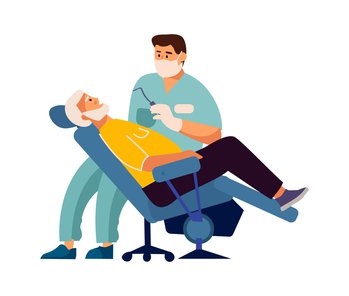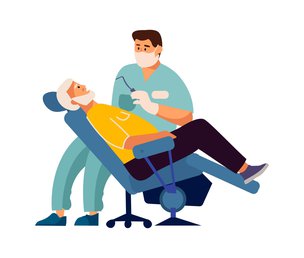
Oral hygiene is an essential aspect of elderly care routines.
Its importance to older people cannot be overemphasized as it enhances their overall health, makes it easy for them to enjoy meals, and help them smile more confidently. Older people generally lose the agility and skillfulness to clean and take care of their teeth as they age. Hence, the need for the younger ones to help with dental care for seniors. For example, older people with dementia may need their caregivers to demonstrate how to brush their teeth.
Common Dental Problems in Older People
There is a direct relationship between an older person's oral health and their overall health. Older people over the age of 55 are at risk of experiencing dental health conditions as well. Some common dental conditions seniors experience include:
Dry mouth
Dry mouth occurs when there's insufficient saliva in the mouth; this makes it more challenging to mix, chew and swallow food. A variety of factors can cause dry mouth; however, most times, dry mouth occurs as a side effect of certain medications. Medications for health conditions such as diabetes, heart disease, and hypertension can cause dry mouth. Dry mouth can be challenging for older persons, and it can cause gum disease and tooth decay if left untreated for a long time.
Tooth decay
Tooth decay is one of the common dental problems older people experience. It occurs when bacteria or plaque affects the tooth enamel, which further causes cavities to develop in the tooth, requiring dental treatment. Tooth decay in older persons usually occurs around the root; this results from the holes (cavities) that appear more at the gum line (between the gum and the teeth) than at the edge of the tooth. Tooth decay is a high dental risk for older people, and the risk is higher in seniors with diabetes or those who consume high sugar diets.
Gum disease
Gum disease occurs when there's a plaque buildup on the gums, which causes infection. This further causes damage to the bone under the gums and the gum's tissue. It also causes inflammation of the gum tissues, difficulty in chewing, pain in the mouth, and loss of the damaged teeth. When gum disease occurs, the patient may experience red and tender gums or bleeding gums. Recent studies have shown a relationship between periodontal disease and diabetes; this implies that older people with diabetes may experience worse symptoms if they have gum disease. Gum disease, when detected early, can be improved by practising proper dental/oral hygiene.
Dental Care for Older People
Caring for the dental health of an older person is generally straightforward. However, they must maintain their oral health regularly to prevent them from having bad breath, tooth decay, and other dental conditions. Here are tips for caring for seniors:
Brush At Least Twice Daily
Older people should brush their teeth at least two times daily. Fluoride toothpaste can help to limit the risk of tooth decay and gum disease; older people should use toothpaste with fluoride to protect their teeth. Fluoride gels and mouthwashes can also provide additional protection against dental disease.
For older persons who can no longer brush themselves, caregivers should brush their teeth gently in circular motions. The tongue and teeth should not be left out. As people get older, the risk of tooth sensitivity increases. When this happens, seniors may use special sensitive toothpaste.
Use a Toothbrush with Soft or Medium Bristles
Toothbrushes with soft or medium bristles are recommended for older people. Toothbrushes should be replaced regularly (between 3-4 months- depending on the condition of the bristles).
Floss Regularly
Flossing is generally crucial as it helps to remove food debris between the teeth. Brushing may not altogether remove food particles, hence the need for flossing. Flossing may be difficult with older people, especially older ones with dementia. However, if possible, caregivers can encourage them to floss. Regular flossing is also required in older people; however, caregivers can consider using single-use flossing kits if it becomes a challenge.
Use Oral Hygiene Aids
Older people can also use oral hygiene aids to help clean their mouths. Electric toothbrushes and other oral cleaning aids can come in handy for older people who are weak and unable to move around. Toothbrushes with Flexi-grip handles are recommended for elders who find it challenging to grip regular toothbrushes. Foam tubes can alternatively be applied to toothbrush handles for a more manageable and firmer grip.
Increase Calcium Intake
Calcium provides a variety of benefits to the oral health of an individual, both old and young. Older people are advised to increase their calcium intake to gain healthy bones, teeth, and gums. Calcium is present in foods like salmon, dairy products, green peas, brown rice, etcetera.
Avoid Sugary Foods
High sugar foods and drinks can increase the risk of developing cavities; older people should cut back on such foods.
Drink Water to Stay Hydrated
Dehydration could worsen dry mouth conditions. Hence, seniors should be encouraged to drink more water during the day to reduce dry mouth. Seniors with severe dry mouth conditions would need to see a physician for medication.
Visit the Dentist Regularly
Finally, ensure that you visit the dentist regularly for routine examinations and dental checkups. Regular visits to the dentist can help to improve the dental health of a senior. An experienced dentist can help with dental care for seniors.
Older people might need assistance to clean their teeth as they age. Caregivers should help them take care of their teeth. Each older person may have what works for them. Hence caregivers should try different ways to find the best option for the elder. For some individuals, the caregiver may need to stand behind the elder with the head tilted to access all corners of the mouth easily.
Best Ways to Care for Dentures
It's essential to clean and care for the dentures of older persons to ensure their durability. Here are tips for caring for dentures:
- Gently brush the tongue, palate, and gums each time the dentures are taken off.
- Dentures should be brushed at least twice daily. Non-abrasive dental products should be used to brush dentures. Avoid using soaps, beaches, and chemicals to avoid discoloration of the dentures. You can leave in water after brushing or soak in a denture cleaning solution for at least four hours daily or overnight.
- It's vital to ensure that older persons should be comfortable wearing and dentures should properly fit when worn.
- Visit a dentist when dentures are broken or do not fit well.
- Dentures can be fragile; they can break easily hence should be placed in a sink filled with water or on a piece of cloth inside a sink to prevent them from breaking.
- Since dentures need to be cleaned regularly, older persons should feel comfortable and okay with wearing dentures to allow easy replacement after cleaning. Cleaning dentures regularly can help you prevent blots, bad breath, and swollen gums.
Why Professional Dental Care is Important
Regular professional dental care is crucial to improve the oral health condition of older persons. Gum disease, tooth decay, and other dental conditions need to be treated by a dentist. Regularly going for dental checkups can help detect any dental condition early and treat it before it worsens. Dental infections can deteriorate and affect the gums, underlying bones that hold the teeth, and mouth tissues. Older people who have limited ability to move can get their live-in care providers to accompany them to go for dental checkups and provide support.
Conclusion
Older people may not be ultimately able to perform oral hygiene routines effectively. However, it's imperative to their overall health; hence relatives and care providers can help them. Regular visits to dentists are crucial for older persons. An older person who experiences gum bleeding when brushing could have gum disease and might need to see a dentist.
Are you looking for care for a loved one? We can provide free support!
Call us on 01865 680331
Send message

